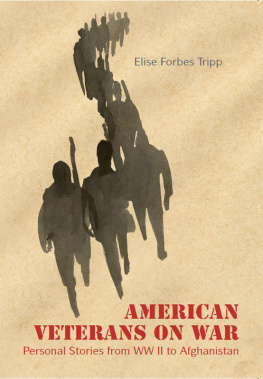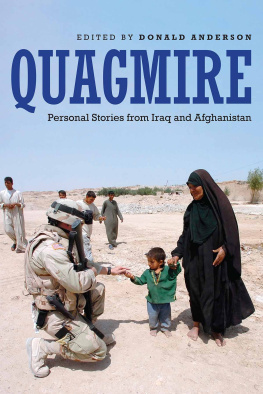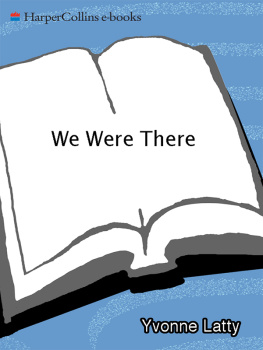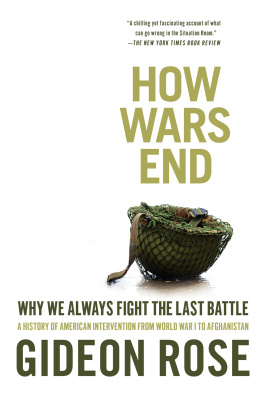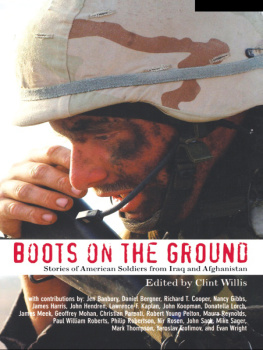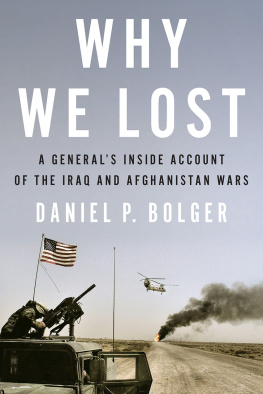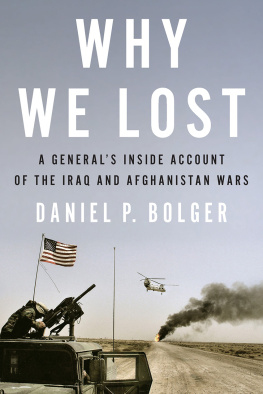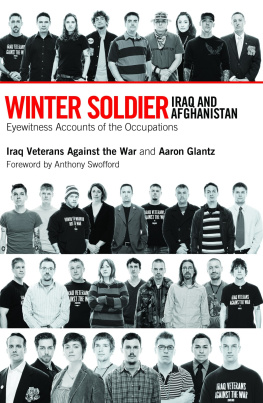Advance Praise for American Veterans on War
The truth of any myth, says Claude Lvi Strauss, is the sum of all of its versions. The same might well be said of any history, especially that of war. There is never one war or one true history of it. Every war is countless, in the lives it touches and in the stories it spawns; and the truth of any war is finally out and safe only once all of its stories have been told and listened to and preserved. Stories are a matter of life and death for war veterans, a road to healing, a road to be traveled by us all. Elise Forbes Tripp has done us all a great service by taking in and passing on to us the resonant voices and stories of fifty-five men and women whose collective military service spans our nations major wars of the last seventy years. They cannot possibly offer the whole truth, but they bring us closer to it. Every shard is precious and indispensable.
Robert Emmet Meagher, Professor of Humanities,
Hampshire College, and author of Herakles Gone Mad:
Rethinking Heroism in an Age of Endless War
American Veterans on War offers fresh and unforgettable accounts as told by US veterans from World War II to Afghanistan and Iraq. It's sensational. I'm also amazed by veterans like Don Ryan who fought in multiple wars. We hear in these voices what it is really like to serve in such different wars, and how veterans will forever carry the imprint of war in their hearts.
Andrew Carroll, editor of the New York Times bestsellers War Letters,
Behind the Lines, and the National Endowment for the Arts Operation Homecoming
Praise for Surviving Iraq: Soldiers Stories
Surviving Iraq is a valuable, indeed indispensable, addition to the literature on the war, especially because it bypasses pretentious analysis and gives us the voices of the soldiers.
Howard Zinn, author of A Peoples History of the United States of America
Engrossing reading that benefits from its simple format
Kirkus Reviews
This fascinating collection of testimonies underscores the universality of all war. [A] shocking, moving and utterly heroic portrait of young men and women in impossible situations
Ken Burns, director and producer, The Civil War, The War (WW II)
[These] extraordinary stories and opinions range from the profound and the patriotic to the humorous and the heartbreaking. Dr. Tripp has done a masterful job of finding a diverse and thoughtful group of individuals and of weaving their oral histories together in a way that makes them, individually and collectively, unforgettable.
Andrew Carroll, editor of War Letters and Behind the Lines

First published in 2012 by
OLIVE BRANCH PRESS
An imprint of Interlink Publishing Group, Inc.
46 Crosby Street, Northampton, Massachusetts 01060
www.interlinkbooks.com
Copyright Elise Forbes Tripp, 2012
All rights reserved. No part of this publication may be reproduced, stored in a retrieval system, or transmitted in any form or by any means, electronic, mechanical, photocopying, recording, or otherwise without the prior permission of the publisher.
Library of Congress Cataloging-in-Publication Data
Tripp, Elise Forbes.
American veterans on war : personal stories from World War II to Afghanistan / by Elise Forbes Tripp.--1st American ed.
p. cm.
ISBN 978-1-56656-867-8 (pbk.)
1. United States--Armed Forces--Biography. 2. Veterans--United
States--Biography. 3. Veterans--United States--Interviews. 4. Vietnam War,
1961-1975--Personal narratives, American. 5. World War, 1939-1945--Personal narratives,
American. 6. United States--History, Military--20th century. 7. United States--History, Military--21st century. 8. Veterans--United States--Attitudes. 9. War--Public
opinion--United States. 10. Public opinion--United States. I. Title.
U52.T77 2011
355.0092'273--dc23
2011023525
Printed and bound in the United States of America
Cover: Watercolor painting by Pennsylvania artist Tom Bostelle,
1977. Bostelle (19212005) served in the US Army, in both Europe and Occupied Japan during World War II. Permission to reproduce granted
by the Bostelle Trust.
Book design by Pam Fontes-May
To request our catalog, please call us toll free at 1-800-238-LINK, visit our
website at www.interlinkbooks.com, or write to
Interlink Publishing
46 Crosby Street, Northampton, MA 01060
e-mail:

This book is dedicated to Leo J. Parent Veterans Services Officer for Central Franklin
County District, MassachusettsFor his 25-year commitment to providing support to all veterans And his invaluable help to the author
Introduction
WHY WE FIGHT
This is a book of personal accounts of the wartime experiences of veterans of World War II, Korea, Vietnam, the Gulf War, and the unfinished wars in Afghanistan and Iraq. The narratives are entirely in the veterans own words as I recorded them in 2009 and 2010. The interviews bring us face to face with the realities of combat and its never-ending aftershocks. The narrators revisit the reasons they were given to fight and what they believed in most while fighting. They also share their present perspective on the purposes, effects, and legacy of their and other US wars. The purpose of an oral history recorded from many individual perspectives is to give readers a varied text from which to draw their own conclusions. The juxtaposition of the living memories of different generations of soldiers adds insight and historical context to where we now find ourselves in Afghanistan and Iraq.
Military leaders often prepare for and fight the previous war, as the old saying goes. Because previous wars and their outcomes are the foundation on which each new generation of leaders, warriors, and citizens builds, I will briefly revisit the inheritance of US foreign wars waged before World War II, before these living veterans spoken memories begin.
Naturally, our national rationales for war hark back to the earliest American colonies and the founding of the United States. US wars previous to World War II deposited layers of political and military antecedents and precedents, creating the geology of American thinking about what we should fight for in the world. These earlier military endeavors will always be a natural part of the story of who, why, when, how, and where the United States fights abroad. Earlier wars have left mental and sentimental habits in the national psyche that are part of the bedrock of our military experience and national beliefs.
For more than two centuries, we attacked, enslaved, killed, or expelled Native Americans who were considered a race apart, so as to occupy the territorial United States that we now live in. We also coveted and fought for lands held by European powers in the New World, and in defeating or buying them out, consolidated the continental United States. We believed in a manifest destiny that led to the west coast, our northern and southern borders, and many ports abroad. We engaged in conflicts that resulted in acquisitions from the Caribbean to the Pacific islands of Hawaii and the Philippines and became a colonial power.
In more recent memory, we became the imperial power that our size, wealth, and people made possible and probable. We developed an ambitious capitalism that has led us to global economic dominance. We have also become the preeminent military power of the world, leading to a ubiquitous military presence overseas that supports a strong and ambitious United States.
Next page
